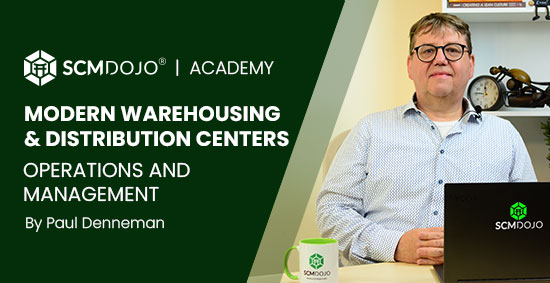Facilities Cost Management
This course covers the importance of internally owned warehouses and externally owned warehouses. Difference from 1PL service providers to 5PL.
Optimizing Outbound and Delivery Costs
This course covers the modes of transport, costs associated with picking, packaging, product value density, packaging density, and KPIs.
Warehouse Design and Operations Diagnostics
This course covers the importance and challenges of warehouse designs and operations.
Supply Chain Network Design - Part 2
This course covers applying all the theoretical concepts and mathematical aspects of supply chain network design.
Cost Categories of Inventory
In this course, you will master cost-effective inventory management strategies for streamlined warehouse operations. Ideal for logistics professionals and supply chain managers
Inbound Operations Course in Logistics
In this course, you will learn elements of Inbound to streamline warehouse operations. Ideal for logistics professionals and supply chain managers
After completing the course
Providing personalized 1:1 support to elevate your experience.
Terminate your subscription at any time, effortlessly online, without the need for a phone call.
Study when you want to
Supply Chain Network Design – Part 1
In this course, you will learn what is the optimum distribution network to minimize transportation, sourcing, warehousing, and inventory costs.
Modern Warehousing & Distribution Centers: Operations and Management
Learn the history of industrial revolution, eCommerce in warehouse & distribution, material handing equipment, technology in supply chain and future of fulfillment.
What is Logistics?
Logistics include moving and storing the goods from the point of origin to the end consumer. Logistics is responsible for delivering goods and services to consumers cost-effectively and efficiently.
Companies have logistics departments within their organization but some outsource the duties. Many companies work as logistics providers. They provide all kinds of services to manufacturers, retailers, and other industries. These logistics companies own transportation to move goods, warehouses to store goods, software, etc. Some provide full-house services, but some specialize in one or two services. DHL, and UPS, are some examples of logistics service providers.
What is the importance of Logistics?
Logistics involves the movement of goods but its effect is not limited to the goods only. If the logistics part is managed efficiently, businesses can enjoy increased efficiencies, lower costs, better inventory control, better production, increased customer satisfaction, better supplier relationships, efficient use of warehouses, etc.
What are the functions of logistics?
There are two main functions of logistics: Transportation and Warehousing. Transportation includes the movement of goods by planning, optimizing routes, and using suitable vehicles from suppliers to the company or the production to the warehouse or the warehouse to the end consumer. Transportation is of four types: Ocean, Rail, Road, and Air. Functions such as order management, freight auditing, payment, optimizing routes, and shipment loads are all covered under transportation management. Most companies use a transport management system to track and do the job. Warehouse management includes majorly managing the inventory and order fulfillment according to the customer demands. Warehouse infrastructure and processes are also managed under this function to increase efficiency. A warehouse management system is used by companies to track inventory and the flow of goods.
What is the study of supply chain and logistics?
Logistics includes moving, storing, and flowing goods and services within and outside the organization. The logistics department caters to all the processes of the flow of goods services and information.
Logistics is a sub-domain of supply chain management. Supply chain and logistics is a multidisciplinary field of study. It includes the concepts of Systems Engineering, Industrial Engineering, Procurement, Operations Management, Logistics, Marketing, and Information Technology.
What is the difference between logistics and supply chain management?
Logistics is the process of delivering goods and services to the end consumers most cost-effectively and efficiently. In comparison, Supply chain management includes the conversion of raw materials to finished goods. It is a process of getting the raw materials from suppliers, sending them in production, storing the product in warehouses, and distributing it to the end customers.
Why choose online logistics and supply chain management courses?
Choosing online logistics and supply chain management courses helps individuals to excel in any roles and skills required in the supply chain and in transportation and distribution without spending too much. These on-demand courses are easily accessible (at home or anywhere), flexible (no time constraint), convenient, and cost-effective. They are taught by industry experts who have years of experience in the field of transportation and logistics. They can provide consistent knowledge, especially for beginners as well as for advanced-level people.
What are the benefits of supply chain logistics certification?
Supply chain logistics certification helps enhance people’s skills in logistics and supply chain management. It is a wonderful way to advance your specific skills for different roles in transportation and distribution. These certifications are a source of career advancement and they add credibility to your expert profile. As it opens doors to many other career opportunities where a salary increase is likely to occur.
Do you need any prerequisites for supply chain and logistics courses?
The requirements of prerequisites vary from course to course and the platform you are seeking knowledge from. Some courses that are advanced level require some basic knowledge of the concepts of supply chain and logistics before you enroll in them to better understand what is being taught and how to put the knowledge into practice. However, some courses that are at the beginner level do not require any prior knowledge to get going. You will need to check the details of the course you are interested in to see if there are any specific requirements before you begin.
Where can you learn more about supply chain and logistics courses?
You need to do thorough research for expert-taught supply chain and logistics courses as they offer practical knowledge from their experience. Platforms like SCMDOJO, Coursera, Linkedin Learning, etc. offer a variety of courses with a recognized certification. These platforms give you access to several courses from beginning to advanced level you can choose from. They offer different bundles and discounts too if you are interested.







